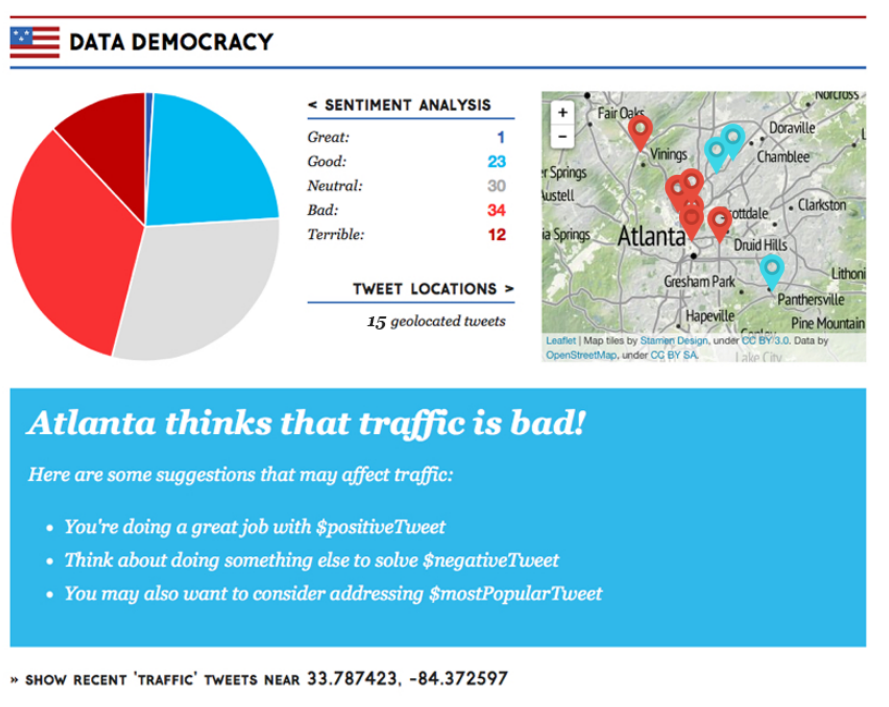Imagining the Future: Speculative Civics
Carl DiSalvo et al’s 2016 paper, Designing Speculative Civics, explores how the idea of Research through Design (RtD) can be applied in a civic context to envision future civic uses of technology. The authors describe four dimensions to RtD: time, representation, design discourse and speculation, and then talk about three different types of research through design, with examples:
RtD as Representations of Systems Yet-to-Come

Here they use the example of The Division of Domestic Data, a 7 week design project which took a real civic issue – division of digital possessions after divorce, which unlike physical possessions is not addressed in law – and tried to imagine what that a user interface for dividing digital possessions might look like. The careful design of icons and subsequent reflections and revisions on them was an important part of the process. In creating interfaces for a space that doesn’t exist, they highlighted the problems of “non-mainstream” use cases not being supported by software or by civic law and also explored the weirdness of digital possessions.
Mediated Civics
Looking through a civic lens, the authors describe this as “mediated civics”, in that this imagined system was specifically conceived to explore the interactions between public and private life for citizens and the role of the state in constructing and decomposing civic units (e.g. a marriage), and helps reflect on those questions.
RtD as Prototyping Systems

Here they discuss Data Democracy, a prototype web application that allows users to enter a search term, e.g. “traffic”, and then explore a map of tweets about that topic in the local area, broken down by sentiment. In this approach to RtD the key thing was the scripting of a working application as a means to help explore both the searched topic and also the wider civic implications of measuring public opinion in this way (for example – not everyone is on Twitter).
Computed Civics
The civic angle of this exploration is the idea of civic participation emerging through conscious data-sharing, as with the Cycle Atlanta project we discussed in our Digital Civics course this week. Here, the publics being examined are informational, they are cohesive only through the lens of the data.
RtD as Use of a System

Here the authors talk about Drones for Foraging, a project they have undertaken with Concrete Jungle, a “foraging collective” in Atlanta. They helped the group to use drones, and subsequently imaging software, to find and identify harvestable fruit on trees that would otherwise go to waste.
Proxied Civics
The civic focus here is on a group of people coming together outside of the system to provide capabilities that are not provided by the state – in other words the use of such technologies, as a public, serve as a proxy for otherwise non-existent civic services. In a way this is similar to the idea of a “Thing” as in Björgvinsson’s paper which I wrote about earlier in this course.
Summary & Critique
It is clear that spending time designing, building or using technologies for civic problems in ways that are not done today, is a highly useful technique both for exploring new civic situations created by technology and also for exploring how technologies might be applied in new ways to help with civic matters. The authors do a convincing job of making this case, and of providing concrete examples of the different ways that this can be done.
As a user-centred software developer, I was disappointed to see how little the public was involved in the first two projects. The Division of Domestic Data concepts do not seem to have been presented to any real “users”, even as mockups. No feedback has been collected – and as someone who has been divorced I can already see some misconceptions they have made about how divorcees are likely to want to handle their digital data. Similarly the Data Democracy project was never tested either with planners or with citizens, nor do they seem to have made any attempt to engage with those who created the tweets being presented in the tool. I feel that in both cases, the value of the insights gained could be much more rich, valuable, and empirically grounded, if they had taken these studies a little further and involved members of the public for feedback.
The third project, Drones for Foraging, is of course very well grounded in a real “user” base, but I felt that this project was somewhat incongruous with the other studies, and I am not convinced by the author’s framing of it as an example of research through design.
The final criticism I would make is that the authors use the term “civics” in an extremely general, and somewhat fluid, sense. You could almost say that they count anything to do with people as being a civic matter. This wouldn’t be too bad, but they also claim that “design is almost always speculative, but this is not the case with civics”. This seems a very weak and contradictory claim. If you’re saying civics is basically everything to do with people, then pretty much all product design would be speculative by their definition. As such, I am not too convinced by the paper’s focus on “speculation” as if it is something unique, novel or that they are the first to apply in this way.
For me, the value of this paper is in providing concrete examples of different types of research through design in a civic context.
Additional Task
The additional task this week was to write about last week’s Experience session. I have done this in a separate blog post, here.
Leave a Reply Cancel reply